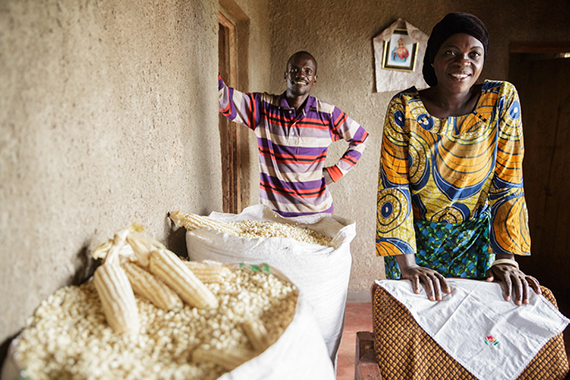For 70 years, Heifer International has been putting the power to produce more food into the hands of smallholder farmers. Heifer founder Dan West's observation--that poor families needed cows, not cups of milk --paved the way for our organization to serve more than 20.7 million families.
We want more for smallholder farmers, however, than simply being able to feed their families and provide life's most basic necessities. We want them to live fulfilled, dignified lives - whatever that means for them, in their own context.

Charlotte Musabyimana and her husband, Valence Ndikubwimana, of Rwanda with some of their corn harvest, which was boosted by their use of goat manure as fertilizer. Photo by Olivier Asselin, courtesy of Heifer International.
Recently we have begun to question the assumption that we have helped lift a family out of poverty by improving their incomes by a certain percent. The global extreme poverty level of $1.25 per person per day is not the yardstick by which we should measure the success of our work. Because, really, is $1.26 a day that much better? If a family's annual income is $600, and we double it, that's not enough if a decent standard of living where they live costs $6,000 a year.
What we are starting to do at Heifer is look, on a country-by-country basis, how much a family needs to earn to afford a dignified life, and how far from that number Heifer participant families are. It's going to be a radical shift, requiring us to examine how much our interventions move the dial on income. It could be as simple as providing families with six beehives instead of only two, or as complex as redesigning entire programs.
I've been grateful to see the attention the world's 600 million smallholder farmers and herders have received during this International Year of Family Farming. But I want us all to consider this: being a smallholder farmer shouldn't mean producing the world's food while continuing to live in poverty, even if it's not "extreme" poverty.
